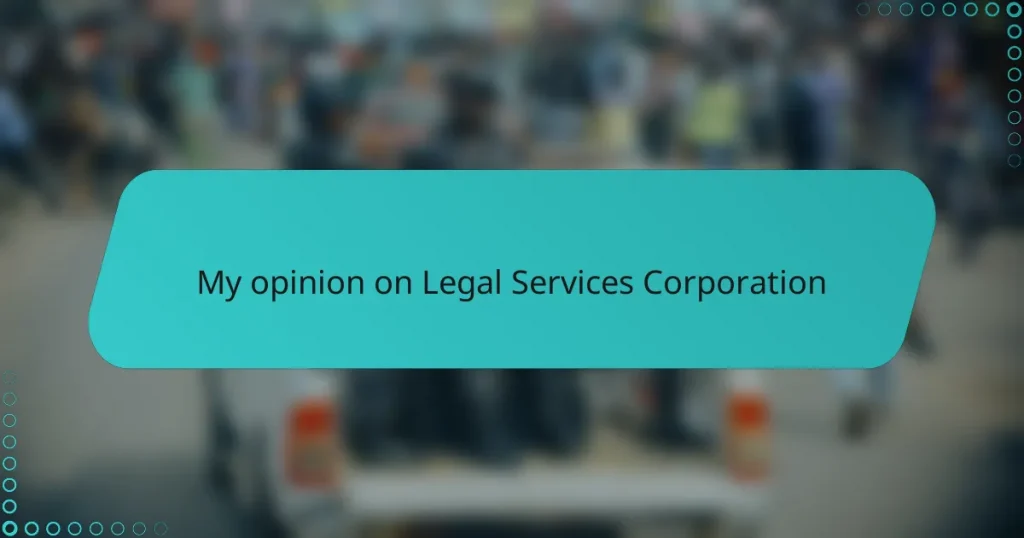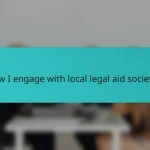Key takeaways
- Legal advocacy is not just about law knowledge; it requires empathy, persistence, and a commitment to fairness to support those in need.
- The Legal Services Corporation (LSC) plays a crucial role in connecting low-income individuals with legal assistance, promoting accountability and transparency in its funding.
- Evaluating LSC’s effectiveness involves looking at the quality of outcomes for clients, integrating a focus on systemic, sustainable change over mere case volume.
- Recommendations for LSC include increasing funding flexibility, enhancing community outreach to raise legal awareness, and fostering collaboration among local programs for greater impact.
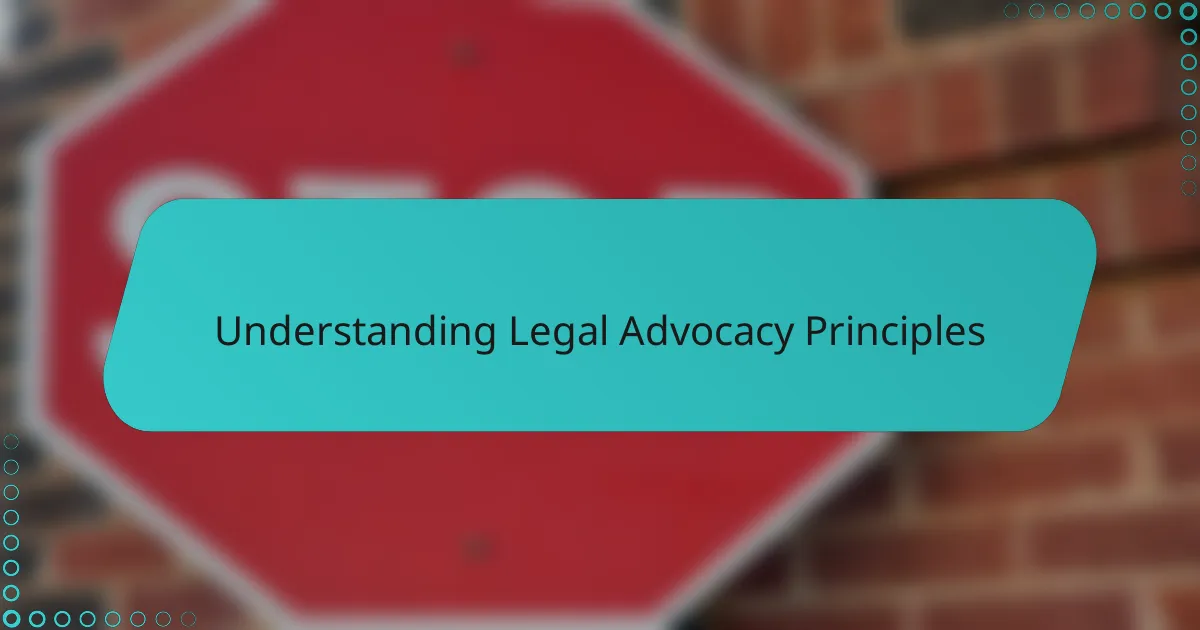
Understanding Legal Advocacy Principles
Legal advocacy, to me, is about more than just knowing the law; it’s about wielding that knowledge to amplify voices often unheard. Have you ever felt the frustration of watching injustice without a clear way to intervene? That’s exactly why understanding the core principles of legal advocacy—like commitment to fairness, persistence, and empathy—is so vital.
In my experience, the most effective advocates are those who see their role as both a legal guide and a compassionate ally. It’s not just about winning a case but ensuring every individual feels supported and respected throughout the process. When you grasp this mindset, legal advocacy transforms from a technical skill into a deeply human endeavor.
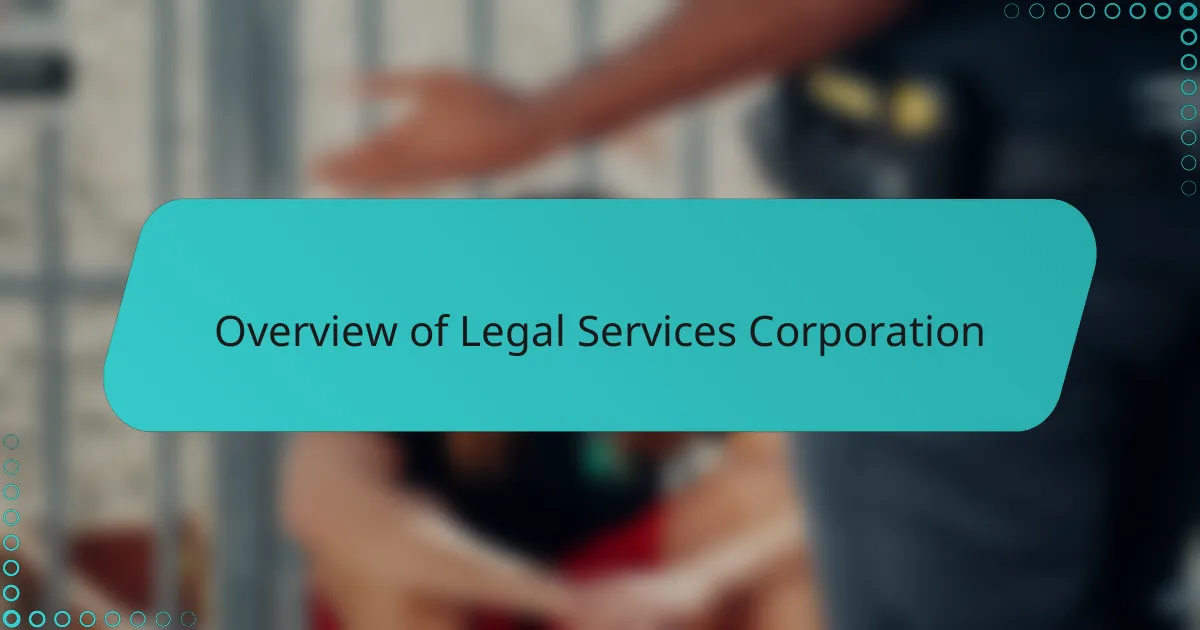
Overview of Legal Services Corporation
The Legal Services Corporation (LSC) stands out as a unique entity in the legal world—it’s a federally funded nonprofit aimed at making sure low-income Americans have access to quality civil legal assistance. I remember the first time I truly appreciated its role; a close friend faced eviction and the LSC-funded attorney’s support made all the difference. It made me realize that legal access isn’t just about laws but about protecting basic human dignity.
How often do we underestimate the power of such organizations? LSC distributes funds to local programs across the country, essentially acting as a lifeline for those who might otherwise be left navigating complex legal systems alone. This network of support feels crucial, especially when you’ve seen firsthand how overwhelming legal challenges can become without proper guidance.
What impresses me most is LSC’s dedication to accountability and integrity—it doesn’t just hand out money blindly but ensures funds are used effectively to fight poverty through legal means. In my opinion, this focus on transparency builds trust, showing the public that justice isn’t a privilege for the few, but a right to be actively preserved and promoted.
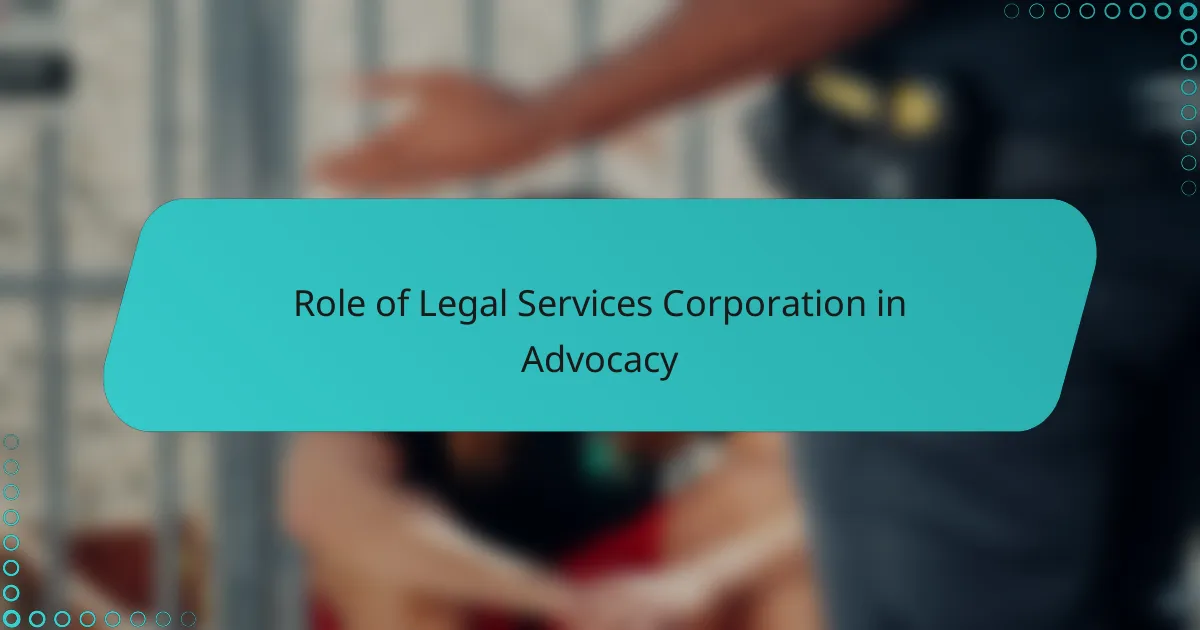
Role of Legal Services Corporation in Advocacy
When I think about the role of the Legal Services Corporation in advocacy, I see it as a powerful bridge connecting people in desperate need with legal help they simply couldn’t afford otherwise. Have you ever wondered what happens when someone faces legal trouble but has no resources? That’s where LSC steps in, ensuring that advocacy isn’t just a concept, but a tangible support system for those struggling to have their voices heard.
From my perspective, LSC’s role goes beyond funding—it actively shapes how advocacy is delivered on the ground. I recall a case where an LSC-supported program helped a family avoid losing their home; the dedicated advocates empowered them to stand up against injustice. This shows me that LSC fuels real defenders of fairness, equipping them with the tools needed to navigate complex legal battles that might otherwise feel overwhelming.
What’s truly inspiring is the way LSC promotes a structured approach to advocacy, requiring grantees to focus on quality and impact, not just volume. It makes me appreciate how thoughtful and strategic their support is—like cultivating a garden where every advocate can grow strong and resilient. Isn’t that exactly what effective legal advocacy should look like?
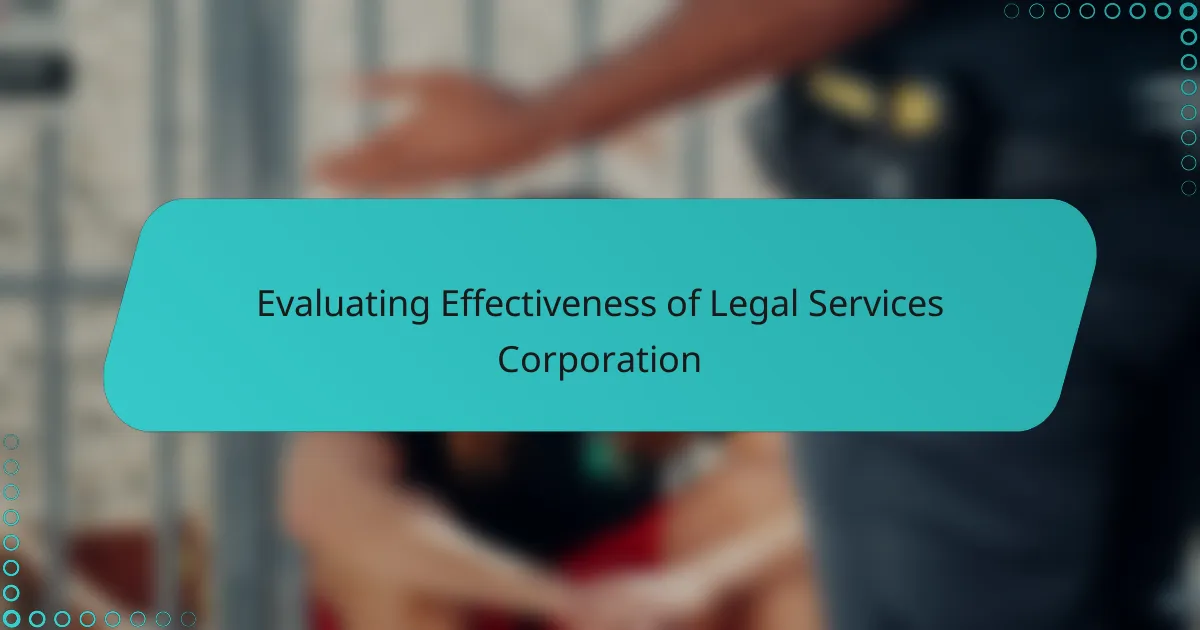
Evaluating Effectiveness of Legal Services Corporation
Evaluating the effectiveness of the Legal Services Corporation often brings me back to those moments when access to justice felt like a distant dream for many. Have you noticed how the real measure isn’t just the number of cases handled, but the lasting impact on clients’ lives? From what I’ve seen, LSC’s emphasis on quality over quantity truly makes a difference in turning legal help into genuine empowerment.
One of the most revealing indicators of LSC’s effectiveness, in my view, is how it strengthens local programs with accountability and strategic focus. I remember learning about an LSC-funded site that didn’t just assist clients but tracked outcomes to improve services continuously. This approach shows me that LSC isn’t satisfied with patchwork solutions—they want systemic, sustainable change.
Still, I sometimes wonder if even more could be done to reach those who remain invisible in the system. Does the current model fully capture the diverse challenges facing different communities? While no solution is perfect, my experience tells me LSC’s commitment to transparency and continuous improvement places it among the most effective advocates for equal legal access today.
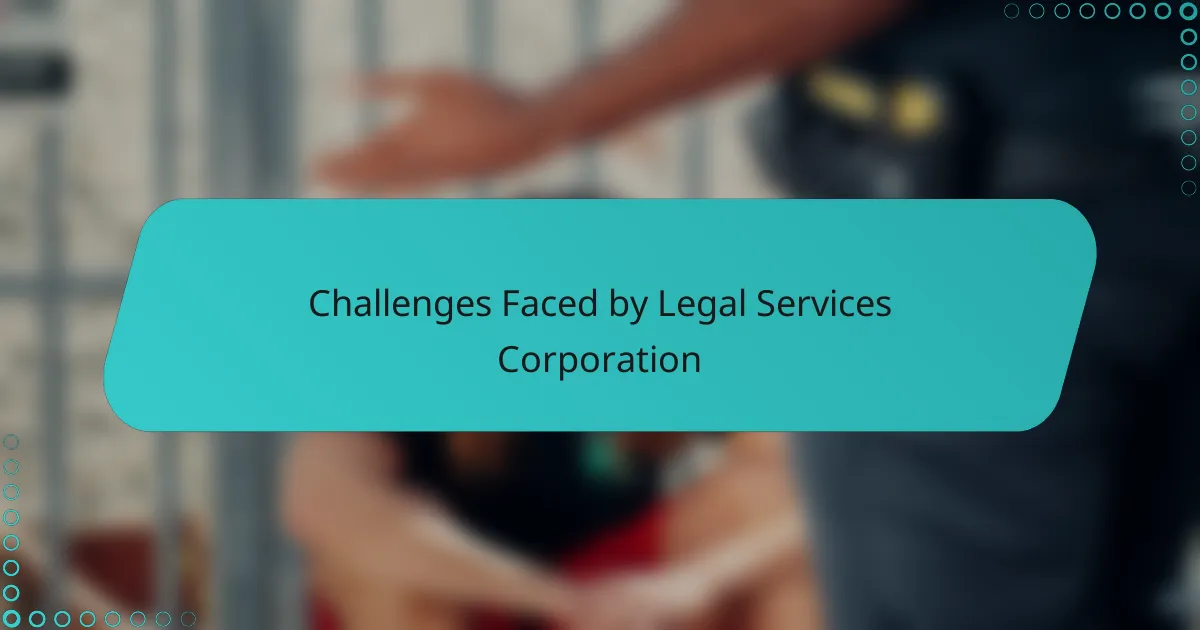
Challenges Faced by Legal Services Corporation
It’s clear to me that one of the biggest challenges facing the Legal Services Corporation is limited funding. Have you ever tried to stretch a fixed budget to cover unpredictable emergencies? That’s exactly what LSC grapples with—demand for legal help far outpaces the resources available, leaving many in desperate need without the support they deserve.
Another hurdle that strikes me is navigating political pressures. The way I see it, legal aid isn’t supposed to be a partisan issue, yet funding and policy decisions often become entangled in political debates. This sometimes hampers LSC’s ability to operate independently and advocate effectively for marginalized communities.
From my experience, I also notice how difficult it is to address the wide range of legal problems across diverse populations. How can one organization tailor support to fit so many unique situations? Balancing quality and quantity becomes a constant tightrope walk, especially when each case represents a life impacted by complex social factors beyond the courtroom.
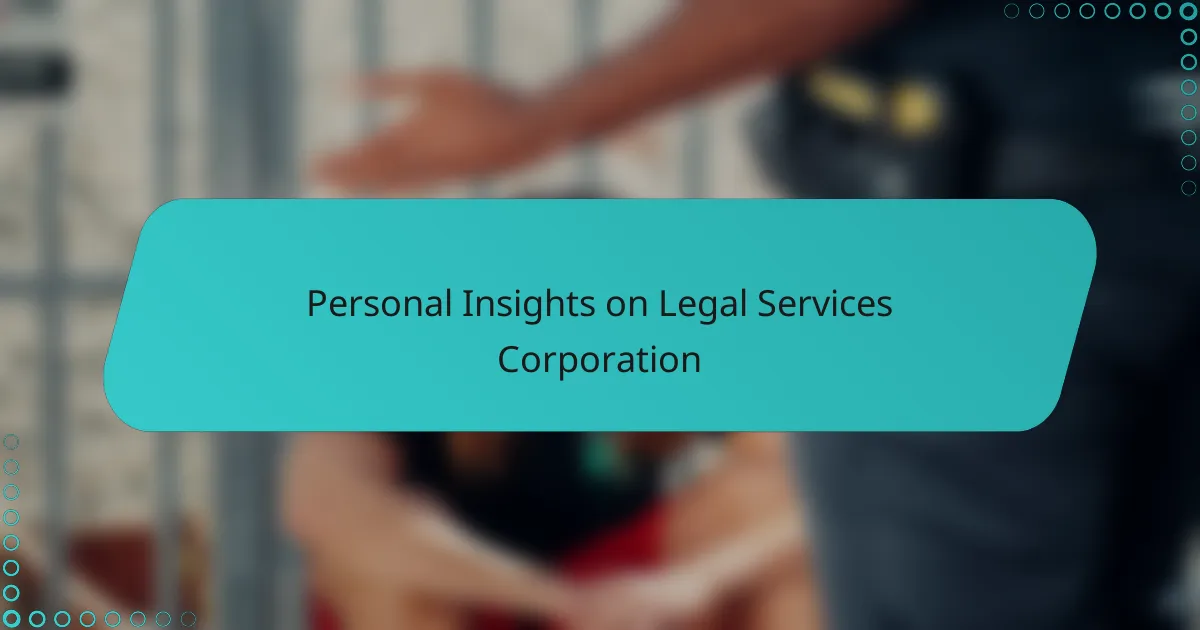
Personal Insights on Legal Services Corporation
Thinking about my own encounters with the Legal Services Corporation, what stands out most is how it embodies a crucial lifeline for those teetering on the edge of legal despair. I recall a moment when I volunteered at a local legal aid event—seeing firsthand how LSC’s funding empowered attorneys to speak up for a mother fighting to keep her children safe left a lasting impression on me. It made me realize that LSC is more than just an institution; it is a beacon of hope in a system that often feels cold and inaccessible.
Have you ever wondered what it truly means for an organization to balance strict accountability with compassionate service? From my experience, LSC walks this fine line with remarkable care. Their insistence on transparency doesn’t come off as bureaucratic red tape but rather as a genuine commitment to making every dollar count where it’s needed most. This approach inspires confidence and makes me believe in the possibility of a more just legal landscape.
At times, I find myself reflecting on the challenges LSC faces in reaching every corner of our diverse nation. How can one entity meet such vast and varied needs without spreading itself too thin? While it’s easy to criticize from the sidelines, my personal insight is that LSC’s persistent efforts to refine and adapt its strategies show a deep understanding of the complexities involved—and that gives me hope for continual progress in legal advocacy.
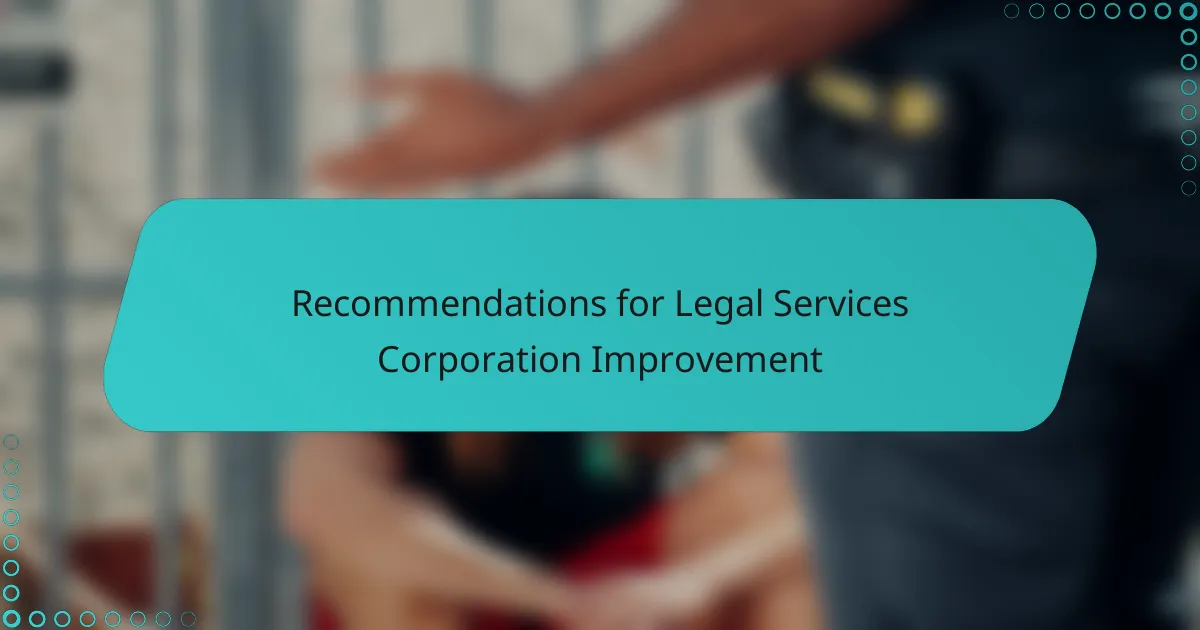
Recommendations for Legal Services Corporation Improvement
One improvement I strongly believe in is increasing funding flexibility for Legal Services Corporation grantees. Have you ever faced a sudden challenge that required quick action without clear budget approval? From my experience, allowing local programs more discretion to allocate funds in emergencies would make their advocacy more responsive and impactful.
Another recommendation I hold dear is enhancing community outreach and education. I recall a time when a neighbor didn’t realize legal help was available until it was almost too late. What if LSC invested more in preventive legal education and awareness campaigns? It could empower many more individuals to seek help early, preventing crises before they escalate.
Finally, I think LSC could benefit from fostering stronger collaboration among its funded programs nationwide. When advocates share strategies and resources, they grow stronger together. Have you noticed how teamwork often leads to creative solutions? In my view, formalizing these networks would amplify their collective effectiveness in tackling systemic issues.
